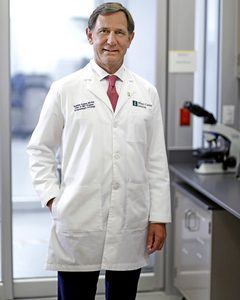|
Getting your Trinity Audio player ready...
|

Promising treatments coming from initial emergency and experimental COVID-19 therapies have developed into clinical trials that were launched recently at Miami Cancer Institute, part of Baptist Health South Florida.
The Institute is leading a trial using mesenchymal stem cells for critically ill patients with SARS-CoV-2 induced respiratory failure. It also is the location of the phase 2, BLAZE-4 trial, which continues work on bamlanivimab, a monoclonal antibody recently awarded Emergency Use Authorization (EUA) status by the Food and Drug Administration for those with mild COVID-19 symptoms.
“It’s exciting to lead these next-generation clinical trials,” said Guenther Koehne, MD, PhD, principal investigator, director and chief of Stem Cell Transplantation, Hematologic Oncology and Benign Hematology at the Institute. “We have learned much about COVID-19 since the pandemic began last winter and our hope is that these trials will lead to tremendous treatment options for a wide range of patients.”
Mesenchymal Stem Cell Trial
Early in the pandemic, Miami Cancer Institute received single-use emergency approval from the FDA to give mesenchymal stem cells ― cells derived from umbilical cord lining tissue ― to several COVID-19 patients who were critically ill. The patients recovered. The stem cells aid in healing by regenerating damaged lung tissue. The formal, phase I/IIa trial opening now is for hospitalized patients who are receiving oxygen therapy or who are on ventilation support and are not showing improvement with other therapies.
“In our early experience with these umbilical cord lining stem cells, we had very promising results,” Dr. Koehne said. “We are very hopeful that the clinical trial will give us evidence that this treatment can save the lives of patients who experience respiratory failure due to COVID-19.”
Bamlanivimab, BLAZE-4 Trial
The Florida Department of Health is allocating bamlanivimab for EUA use and Baptist Health has a limited supply. Miami Cancer Institute participated in the monoclonal antibody’s phase 1 study, BLAZE-1, which led to the EUA. Now the Institute is enrolling patients in the phase 2 study, BLAZE-4.
Bamlanivimab can be given as an IV infusion to COVID-19-positive patients who are not hospitalized and have mild symptoms. It must be administered within 72 hours of a positive test result. It works by prohibiting the virus from anchoring to ACE2 receptors, which are proteins on the surface of many cells that allow the SARS-CoV-2 virus to enter and infect cells. In the initial study, it showed a subsequent hospitalization rate of 1.7 percent among those who received the drug versus a 6 percent hospitalization rate among those who received a placebo.
The BLAZE-4 trial is a randomized, double-blind, placebo-controlled study to evaluate the efficacy and safety of bamlanivimab (also known as LY3819253) both on its own and in combination with another monoclonal antibody specific to target the spike protein of SARS-CoV-2 to prevent the virus from entering into the epithelial cells (LY3832479). There are five arms to the trial. Arm 1 is a placebo. Arms 2, 3 and 4 consist of bamlanivimab plus a second monoclonal antibody (both given in different dosages). Arm 5 is bamlanivimab alone.
“As a physician-scientist, I won’t settle for the standard of care. I am always looking for better. This is a promising step forward,” Dr. Koehne said. “We have reached a new level of sophistication ― trying to treat the virus before it makes you really sick.”
The first trial showed that bamlanivimab may reduce viral load, symptoms and risk of hospitalizations and emergency room visits associated with COVID-19 and this trial may further improve the outcomes.
“Despite the prospect of having COVID-19 vaccines in the future, which are intended to prevent from getting sick, we need to stay focused on the treatment of those individuals that are symptomatic from the virus,” Dr. Koehne added.
Visit https://baptisthealth.net/cancer-care/clinical for more information about clinical trials at Miami Cancer Institute.





